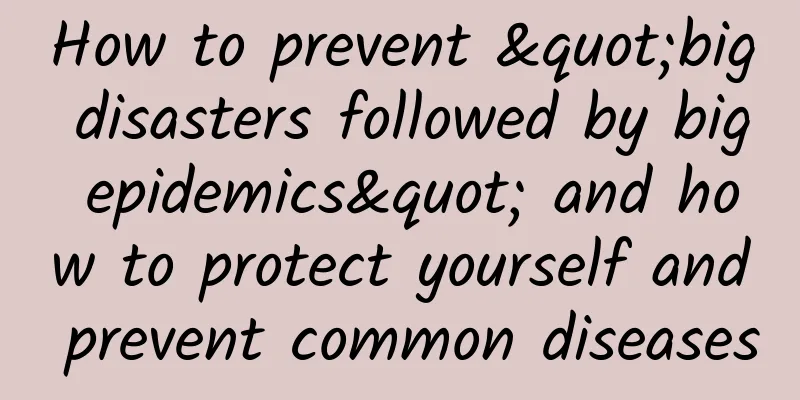How to prevent "big disasters followed by big epidemics" and how to protect yourself and prevent common diseases

|
People's Daily, Beijing, July 21 (Reporter Cui Yuanyuan) Since July 17, Henan has experienced continuous heavy rainfall, with heavy rain and torrential rain occurring in most parts of the province. The heavy rainfall was mainly concentrated in the western, northern and central regions. Ten cities including Zhengzhou, Jiaozuo and Xinxiang experienced extremely heavy rain, which had a great impact on the production and life of local people. According to the website of the Central Meteorological Observatory, heavy to torrential rain is predicted in parts of central and northern Henan, central and southern Hebei, eastern Shanxi, central and western coastal areas of Guangdong, southeastern Guangxi, northwestern Hainan Island, and southern Yunnan from 08:00 on July 21 to 08:00 on July 22. Among them, northern Henan and southern Hebei will have extremely heavy rain (250-280 mm). Some of the above-mentioned areas will be accompanied by short-term heavy rainfall (maximum hourly rainfall of 30-50 mm, exceeding 70 mm in some areas), and strong convective weather such as thunderstorms and gales will occur in some areas. At present, due to the long duration of precipitation and the concentrated area of heavy precipitation, the risk of mountain torrents and geological disasters in the western and northwestern mountainous areas of Henan has increased significantly. The water levels of small and medium-sized rivers and reservoirs in the Yellow River and Haihe River basins have risen rapidly. In addition, large-scale urban waterlogging and farmland waterlogging have occurred. After a flood disaster occurs, how should people protect their personal health? How can they prevent common diseases after a disaster? 10 key points for good health protection The Chinese Center for Disease Control and Prevention reminds everyone to take 10 protective measures: 1. Drinking water hygiene. Do not drink raw water, only boiled water or bottled or barreled water that meets hygiene standards; water containers must be clean and emptied and cleaned frequently; temporary drinking well water, river water, lake water, pond water, etc. must be disinfected; water with high turbidity and serious pollution must be clarified with alum before disinfection; drinking water disinfectants (bleaching tablets, disinfectant effervescent tablets) must be stored in a dark, dry, and cool place (such as using brown bottles with the caps tightened). If the tap water pipes or faucets are contaminated, the pipes should be fully cleaned after the water is drained, and the faucet surface should be wiped and disinfected with a chlorine-containing disinfectant. 2. Food hygiene. Food should be cooked thoroughly, raw and cooked food should be separated, tableware should be cleaned and disinfected before use, and hands should be washed before eating; do not eat food that has been spoiled or soaked in flood water; do not eat drowned or diseased poultry, livestock, or aquatic products; do not eat leftovers or raw or cold food; do not buy food from stalls without food business licenses. 3. Environmental sanitation. Thoroughly clean the indoor and outdoor environment, and do it first, then disinfect, and then move back. Drain stagnant water, remove sludge and garbage; open doors and windows, ventilate, clean furniture, clean indoor items, and disinfect the walls and floors of the room when necessary; renovate toilets, clean bathrooms, and repair poultry and livestock pens. Do not urinate or defecate anywhere, and feces, excrement and garbage should be discharged in designated areas. 4. Control of vectors. Install mosquito and fly prevention facilities such as screen doors, screen windows, and mosquito nets in residences; it is recommended to use mosquito coils, aerosol cans, fly swatters and other household mosquito and fly control measures; flood control personnel should be equipped with mosquito-proof hats and wear long-sleeved clothes and pants, and repellents can be sprayed on exposed parts. Use efficient and safe anticoagulant rodenticides to kill rats; search for dead rats in a timely manner after killing rats, and bury or burn them in a centralized manner; when rodents die or migrate in floods, parasites on their bodies will detach or escape. When killing rats, spray insecticides at residents' resettlement sites to eliminate free fleas and other parasites that have left the rats' bodies, and do a good job of killing rats and insects. When mosquitoes, flies, rats and other vectors increase abnormally, report to local government departments in a timely manner. 5. Hand cleanliness. Do not rub your eyes with your hands, especially dirty hands. Each person should use their own towel and wash basin. If you have to share a wash basin with a patient with acute hemorrhagic conjunctivitis (commonly known as pink eye), let the healthy person use it first and then the patient. After use, wash the wash basin with soap and soak it in disinfectant frequently. 6. Prevent skin ulcers. Keep your skin clean and dry, and wipe off sweat with a towel. You can apply some prickly heat powder on the wrinkles of your skin. When working in the water, take a break every 1 to 2 hours, dry your feet, and expose them to the sun for a while. After each work, be sure to wash your feet and wear dry shoes. If you find that the skin on your feet is broken and has a tendency to worsen, you should temporarily stay out of the water if the situation permits. Try to wear long boots. People with foot skin diseases should go into the water less often. 7. Prevent schistosomiasis. In areas where schistosomiasis is prevalent, avoiding contact with infected water is the best way to prevent schistosomiasis. Before contact with infected water, apply protective ointment to parts that may come into contact with infected water. On the premise of preventing heat stroke, protective equipment such as rubber boots, rubber gloves, and rubber pants can be worn. After contact with infected water, you should take the initiative to go to the schistosomiasis prevention department for examination, and if you are found to be infected, you should receive early treatment. 8. Seek medical treatment promptly. If you feel unwell, you should seek medical treatment promptly. Especially for patients with fever or diarrhea, you should seek medical help as soon as possible. Secondly, follow the doctor's advice, cooperate with the isolation of infectious diseases, and pay attention to the use of drugs. 9. Mental health. Acute stress reactions are prone to occur after a disaster, and most of them are significantly relieved within 30 days. Maintain a positive mental state and a good lifestyle. If you have not recovered after more than a month, you should seek help from a psychiatrist or consult a psychological crisis intervention agency. 10. Nursing for special groups: Create a better environment for the elderly, the weak, the young and the sick to reduce injuries, disabilities and deaths. After floods, beware of these common diseases The Chinese Center for Disease Control and Prevention reminds that after flood disasters, due to factors such as deteriorating drinking water and food hygiene conditions, environmental pollution, the breeding of vectors, increased contact opportunities for people and decreased resistance, various infectious diseases are prone to occur, especially intestinal infectious diseases, insect-borne and natural epidemic infectious diseases, infectious diseases through close contact, etc., and it is very important to do a good job in the prevention and control of these diseases. Enteric infectious diseases are a type of disease in which pathogens invade the intestines through the mouth and cause diarrhea and/or other organ and systemic infections. Common enteric infectious diseases in the disaster area include bacterial dysentery, cholera, typhoid and paratyphoid, bacterial infectious diarrhea caused by other bacteria such as Salmonella, Vibrio parahaemolyticus, Campylobacter jejuni, pathogenic Escherichia coli, Yersinia, viral diarrhea (rotavirus, calicivirus, enteroadenovirus and astrovirus infectious diarrhea), and parasitic diarrhea (Cryptosporidium, etc.). Other enteric infectious diseases include hepatitis A, hepatitis E, hand, foot and mouth disease, etc. Natural epidemic diseases refer to diseases that exist for a long time under natural conditions, are prevalent among wild animals, and can infect humans under certain conditions. Natural epidemic diseases are significantly affected by natural factors. Changes in the natural environment during floods, including changes in temperature, humidity, water level, and habitat of vectors, affect the growth, reproduction, and living habits of pathogens, sources of infection, vectors, and hosts. On the other hand, during natural disasters, the poor living conditions, malnutrition, and mental and psychological depression of the people in the disaster area reduce the body's resistance to disease and damage the health and disease prevention measures in the disaster area, which can easily lead to the spread and outbreak of natural epidemic diseases. Natural epidemic infectious diseases that need to be focused on after floods include hemorrhagic fever with renal syndrome (epidemic hemorrhagic fever), leptospirosis, epidemic encephalitis B, malaria, schistosomiasis, plague, anthrax, brucellosis, etc. What measures should be taken to prevent and control these diseases? 1. Cholera Do not eat raw seafood. The containers for processing and storing seafood should be kept separate for raw and cooked food. They should be eaten after being cooked. People who clean seafood should wash their hands thoroughly before touching food and tableware. Do not drink raw water, only boiled water and qualified bottled water. Avoid large gatherings and eating leftovers. Do not urinate or defecate anywhere, let alone near wells and rivers. Seek medical attention immediately if painless diarrhea and vomiting occur. Clean and disinfect the ground, containers, toilets, faucets, clothing and bedding contaminated by feces and vomitus. People engaged in catering services, garbage and feces disposal, or the general population can take oral cholera vaccines in a timely manner according to the recommendations of professional organizations. 2. Bacillary dysentery Do not eat unwashed fruits and vegetables. Peel fruits before eating. Eat less cold dishes. Do not eat or eat less cooked meat cold dishes. Eating raw garlic can help prevent it. Cook food thoroughly. Wash hands before and after meals and before processing food. Prevent flies from biting and crawling on food. Do not drink raw water, only boiled water or qualified bottled water. Do not urinate or defecate anywhere. See a doctor immediately if you have watery stools, loose stools, bloody stools, abdominal pain, and tenesmus. Children with high fever convulsions should see a doctor to rule out toxic dysentery. 3. Typhoid and Paratyphoid Do not eat unwashed raw vegetables and fruits; do not eat uncooked shellfish and other seafood. Do not drink raw water, only boiled water and qualified bottled water; wash hands before meals, after defecation, and before processing food; do not urinate or defecate anywhere. At present, the symptoms of typhoid and paratyphoid are generally atypical. If there is a fever lasting more than 3 days, headache, poor appetite, and a history of eating unclean or cold food, you should seek medical treatment immediately. People engaged in catering services, garbage and feces disposal, or the general population should be vaccinated against typhoid according to the recommendations of professional organizations. 4. Hepatitis A Do not eat unwashed lettuce, uncooked shellfish and other marine products. Do not drink raw water, only boiled water and qualified bottled water; wash hands before meals, after defecation and before processing food; do not urinate or defecate anywhere. Do not share tableware such as water cups; seek medical treatment immediately if you have digestive symptoms such as yellowing of the skin and sclera of the eyes, nausea, aversion to greasy food, and poor appetite. People who work in catering services, garbage and feces disposal, or the general population should get vaccinated against hepatitis A according to the recommendations of professional organizations. 5. Hand, foot and mouth disease Wash your hands frequently with clean water and soap, especially before touching your mouth and nose, before eating or handling food, after going to the toilet, when your hands are contaminated by blisters or respiratory secretions, after changing baby diapers, and after handling contaminated items. Clean and disinfect tableware, utensils, objects or surfaces (such as furniture, toys and shared objects) that you touch daily, as well as objects and utensils contaminated by secretions, vomitus and feces. Try not to share towels or other personal items. Adults should change clean clothes and wash their hands before contacting infants and young children after going out. Do not feed infants food that adults have chewed; avoid close contact with patients, such as playing and kissing. Try to avoid crowded public places as much as possible to reduce the chance of infection. Keep the home or kindergarten indoors well ventilated. According to the recommendation of professional organizations, children under 3 years old can be vaccinated with enterovirus 71 (EV71) vaccine to reduce the incidence of EV71 infection and the resulting severe illness and death. 6. Food poisoning Food should be cooked thoroughly, raw and cooked food should be separated, tableware should be cleaned and disinfected before use, and hands should be washed before eating; do not eat food that has been spoiled or soaked in flood water; do not eat drowned, diseased, dead poultry, livestock, or aquatic products; do not eat leftovers or raw or cold food; do not buy food from stalls without health permits; do not eat moldy food; do not pick wild mushrooms for consumption. Avoid misusing industrial salt as edible salt; food should be stored in a dry, low-temperature place, not easily attacked by rodents, flies, or cockroaches, and prevent rat poison from contaminating food. Large gatherings should be avoided or reduced during floods and when water recedes. 7. Waterborne Diseases Do not drink raw water, only boiled water or bottled or barreled water that meets hygiene standards; water containers must be clean and emptied and cleaned frequently; temporary drinking well water, river water, lake water, pond water, etc. must be disinfected; water with high turbidity and serious pollution must be clarified with alum before disinfection; drinking water disinfectants (bleaching tablets, disinfectant effervescent tablets) must be stored in a dark, dry, and cool place (such as using brown bottles with the caps tightened). If the tap water pipes or faucets are contaminated, the pipes should be fully cleaned after the water is drained, and the surface of the faucet should be wiped and disinfected with a chlorine-containing disinfectant. Centralized water supply should be disinfected strictly in accordance with regulations, and the residual chlorine in the terminal water must meet national standards. 8. Acute hemorrhagic conjunctivitis Pay attention to hand hygiene. Do not rub your eyes with your hands, especially dirty hands. Each person should use their own towel and wash basin. If you have to share a wash basin with a patient with acute hemorrhagic conjunctivitis (commonly known as pink eye), let the healthy person use it first and the patient use it later. Wash the wash basin with soap after use and soak it in disinfectant frequently. Do not use alcohol disinfectant, but use chlorine-containing disinfectant. 9. Hemorrhagic Fever with Renal Syndrome It is necessary to do a good job in hygiene and self-protection, such as ensuring that there are no rats in the home and workplace; properly storing grain and food to prevent contamination by rats; when cleaning places contaminated with rat urine and feces, take appropriate protection, wear rubber or plastic gloves, and wear a mask; take anti-rat and extermination measures to prevent rats from entering the room; do not take extermination measures such as manually disturbing rat nests. 10. Leptospirosis July to September is the high-incidence season for leptospirosis. The affected areas are high-incidence areas for leptospirosis. During this flood disaster season, the people have more chances to come into contact with infected water, the risk of disease increases, and the number of cases during the flood season may increase. People in the disaster areas should avoid contact with infected water, keep pigs and other livestock in pens, actively cooperate with the government in carrying out patriotic health activities such as rodent control, and seek medical treatment in time if symptoms occur. Flood rescue personnel and farmers participating in rice harvesting can be vaccinated or take preventive medication when necessary. 11. Anthrax The natural anthrax foci are widely distributed in my country, and anthrax cases occur from time to time. July to September is the peak season for anthrax. Floods are a risk factor for the outbreak of anthrax in animals, and there is a risk of anthrax outbreaks in local areas in the affected areas. Therefore, the most important measure for people in the disaster area to prevent anthrax is not to contact dead animals. If cattle, sheep and other animals suddenly die, they must do "three nos", that is, not slaughter, not eat, and not buy and sell, and immediately report to the local agricultural and animal husbandry department for handling. Once you find yourself or someone around you showing symptoms of anthrax, you should immediately report to the local health center or disease prevention and control agency and seek medical treatment in time. Pay attention to purchasing beef and mutton products from regular channels, and do not buy or eat dead livestock or meat from unknown sources. 12. Brucellosis Wear gloves, masks and waterproof aprons when in contact with sick sheep, cattle and other livestock. Do not drink raw milk or eat uncooked meat. The main symptoms of acute brucellosis are fever, fatigue, sweating, muscle and joint pain, and enlarged liver, spleen and lymph nodes. If suspected symptoms of brucellosis occur, seek medical attention as soon as possible. Delayed treatment can lead to chronic disease and cause greater harm to the body. 13. Schistosomiasis Be alert to the prevalence of schistosomiasis in disaster areas. Schistosomiasis is mainly prevalent in Hunan, Hubei, Jiangxi, Anhui, Jiangsu, Sichuan, Yunnan and other provinces in my country. Flood relief workers from other places should be particularly alert to whether there is schistosomiasis prevalence in the area, consult local residents or disease prevention and control agencies, and learn about the local schistosomiasis prevalence and whether there is water from surrounding schistosomiasis prevalence areas during the local water system flood. Pay attention to water safety. In areas where schistosomiasis is prevalent, or areas that may be affected by water from schistosomiasis prevalent areas, it is forbidden to drink raw water directly. Only boiled water or bottled or barreled water that meets hygiene standards can be drunk. Water used for washing hands, washing clothes, etc. should be disinfected. Add 0.5 grams of bleaching essence or 1 gram of bleaching powder to every 50 kilograms of drinking water. Avoid contact with infected water. Swimming, playing in the water, washing hands, washing clothes, etc. in natural water bodies in epidemic areas are prohibited, and contact with infected water or water bodies where snails are distributed is avoided. Take good personal protection. If you must come into contact with infected water, you should apply protective ointment to parts of your body that may come into contact with infected water. If you continue to come into contact with infected water for longer than the effective period of the medicine in the ointment, you should apply the medicine again. On the premise of preventing heat stroke, you can wear waterproof long rubber boots, pants, gloves and other protective equipment. Actively accept schistosomiasis infection examination. If you fail to take adequate protective measures when you come into contact with infected water, especially rescue workers from other places, you should take the initiative to go to the schistosomiasis prevention department for schistosomiasis examination, and seek early treatment if you are found to be infected. Seek medical attention promptly if you have symptoms. If you experience fever, diarrhea, fatigue, or other symptoms after contact with infected water, seek medical help as soon as possible and proactively inform your doctor that you have recently been in contact with infected water in an area where schistosomiasis is prevalent so that you can get a diagnosis and treatment as soon as possible. Small water areas and grassy beaches near temporary settlements where snails are distributed can be treated with niclosamide to kill cercariae and snails. The spraying dose is 2-3g/m2; the immersion dose is 2-3g/m3 of water. Strengthen the management of livestock and excrement. During floods, livestock such as cattle and sheep should be kept in concentrated pens as much as possible, and grazing in areas with snails is prohibited. Human and livestock excrement should be collected as promptly as possible and uniformly treated harmlessly to prevent excrement from flowing into the water. 14. Malaria Strengthen epidemic monitoring, establish epidemic monitoring points, grasp the epidemic situation in a timely and accurate manner, analyze trends, make forecasts, and provide a scientific basis for formulating prevention and control measures. Strengthen blood tests for patients with fever, promptly detect sources of infection, standardize the treatment of symptomatic patients, promptly carry out epidemic site disposal, and prevent the accumulation and spread of sources of infection. Carry out vector control measures and conduct indoor residual spraying with pyrethroids in settlements and residential areas in disaster-stricken areas with high malaria incidence and high mosquito density. Use mosquito coils, insecticide soaked mosquito nets or long-lasting mosquito nets, and install screen doors and windows in homes where conditions permit. It is recommended to wear long sleeves and long pants, spray tinctures, creams, liquids and other repellents on exposed skin, change sleeping habits and other personal protective measures to reduce mosquito bites. Carry out patriotic health campaigns, remove weeds and sludge, fill potholes, improve environmental sanitation, and reduce and eliminate mosquito breeding grounds. Carry out health education activities on malaria prevention knowledge to enhance the self-protection awareness and protection capabilities of people in disaster-stricken areas. |
<<: Latest report! The virus strain in Nanjing is the Delta strain
>>: What are the characteristics of tea tree mushroom? Is hazel mushroom a tea tree mushroom?
Recommend
36 weeks pregnant back pain
As a woman's pregnancy progresses, the baby g...
2023 National Love Teeth Day Core Message (I) Maintaining oral health and promoting overall health
Author: Yu Guangyan, Peking University School of ...
What causes hydronephrosis in women?
Due to the differences in the physiological struc...
How to treat uterine prolapse
How should uterine prolapse be treated? In fact, ...
Will constipation and bleeding during pregnancy cause miscarriage?
Many people are troubled by constipation due to l...
How to make breasts bigger during development
We know that full breasts are crucial to enhancin...
What should I do if there is an empty gestational sac and embryo arrest?
In fact, an empty gestational sac is also a type ...
A woman dreams of her husband's head bleeding
Dream mirrors have always been strange and come i...
39 weeks of pregnancy, the fetus is still hiccuping
When the fetus arrives and there are fetal moveme...
Is there any scientific basis for the saying “diseases come from the mouth”?
"Diseases come from the mouth" is somet...
What should women do if they have breast pain due to breast hyperplasia?
With the advent of the new era, women have become...
What is there to do in Qinhuangdao in autumn? Where do the locals in Qinhuangdao go to the beach?
Qinhuangdao has little rain and dry weather in au...
We are so close that we drink until we bleed? Please! Please don't, don't, don't, don't, don't persuade me to drink again!
The New Year is coming, and friends and family ar...
Can I have sex on the first day of my period?
For newlyweds, they have a strong desire for sex,...
Confinement is one month of menstruation
Whether or not you have menstruation after confin...









